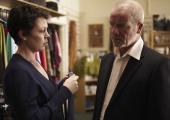Burton and Taylor, BBC Four

Channel's dramas about the private lives of the famous end with a touching valediction
They’ve served BBC Four well, these dramas about the private lives of the stars. From writers to comics, presenters to chefs, the secret traumas of yesteryear’s celebs have entertained and enlightened. And, if we’re honest, embellished. Now that the channel has given up making drama, viewers will have to get their scripted gossip from alternative sources. In Burton and Taylor, the run concluded by peeping through the curtain at two of the most public private lives of all.









